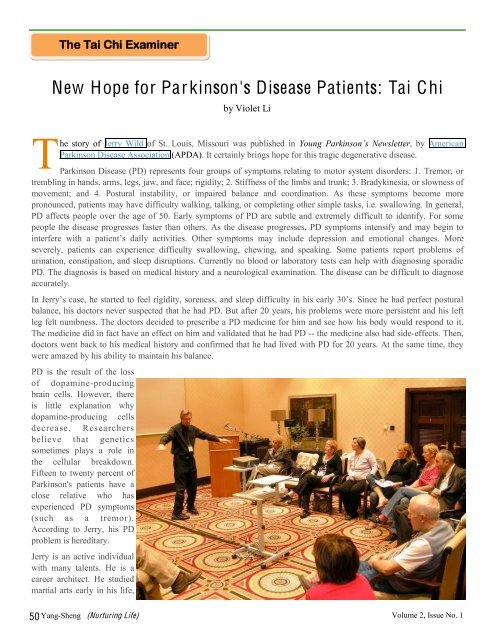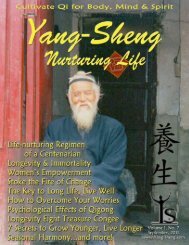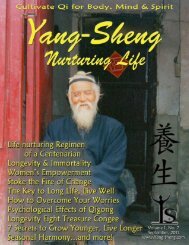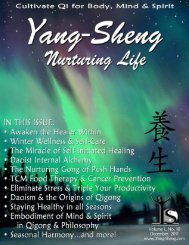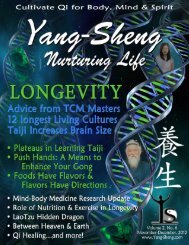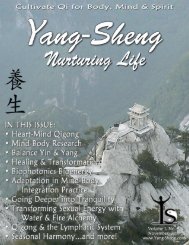Download PDF - Yang-Sheng
Download PDF - Yang-Sheng
Download PDF - Yang-Sheng
Create successful ePaper yourself
Turn your PDF publications into a flip-book with our unique Google optimized e-Paper software.
T he<br />
The Tai Chi Examiner<br />
New Hope for Parkinson's Disease Patients: Tai Chi<br />
by Violet Li<br />
story of Jerry Wild of St. Louis, Missouri was published in Young Parkinson’s Newsletter, by American<br />
Parkinson Disease Association (APDA). It certainly brings hope for this tragic degenerative disease.<br />
Parkinson Disease (PD) represents four groups of symptoms relating to motor system disorders: 1. Tremor, or<br />
trembling in hands, arms, legs, jaw, and face; rigidity; 2. Stiffness of the limbs and trunk; 3. Bradykinesia, or slowness of<br />
movement; and 4. Postural instability, or impaired balance and coordination. As these symptoms become more<br />
pronounced, patients may have difficulty walking, talking, or completing other simple tasks, i.e. swallowing. In general,<br />
PD affects people over the age of 50. Early symptoms of PD are subtle and extremely difficult to identify. For some<br />
people the disease progresses faster than others. As the disease progresses, PD symptoms intensify and may begin to<br />
interfere with a patient’s daily activities. Other symptoms may include depression and emotional changes. More<br />
severely, patients can experience difficulty swallowing, chewing, and speaking. Some patients report problems of<br />
urination, constipation, and sleep disruptions. Currently no blood or laboratory tests can help with diagnosing sporadic<br />
PD. The diagnosis is based on medical history and a neurological examination. The disease can be difficult to diagnose<br />
accurately.<br />
In Jerry’s case, he started to feel rigidity, soreness, and sleep difficulty in his early 30’s. Since he had perfect postural<br />
balance, his doctors never suspected that he had PD. But after 20 years, his problems were more persistent and his left<br />
leg felt numbness. The doctors decided to prescribe a PD medicine for him and see how his body would respond to it.<br />
The medicine did in fact have an effect on him and validated that he had PD -- the medicine also had side-effects. Then,<br />
doctors went back to his medical history and confirmed that he had lived with PD for 20 years. At the same time, they<br />
were amazed by his ability to maintain his balance.<br />
PD is the result of the loss<br />
of dopamine-producing<br />
brain cells. However, there<br />
is little explanation why<br />
dopamine-producing cells<br />
decrease. Researchers<br />
believe that genetics<br />
sometimes plays a role in<br />
the cellular breakdown.<br />
Fifteen to twenty percent of<br />
Parkinson's patients have a<br />
close relative who has<br />
experienced PD symptoms<br />
(such as a tremor).<br />
According to Jerry, his PD<br />
problem is hereditary.<br />
Jerry is an active individual<br />
with many talents. He is a<br />
career architect. He studied<br />
martial arts early in his life,<br />
50 <strong>Yang</strong>-<strong>Sheng</strong> (Nurturing Life) Volume 2, Issue No. 1


